- Home
- Elizabeth George
Deception on His Mind Page 2
Deception on His Mind Read online
Page 2
The air felt close. Outside, the cries of the birds rose and fell. As he reached the opening, Ian could hear wings flapping and webbed feet scuttling as the more intrepid gulls descended once again. This would not do, Ian thought grimly. He was the human, after all, master of the planet and king of all that he surveyed. It wasn't thinkable that a gang of hooligan birds could presume a dominance over him.
He said, “Shoo! Off with you! Get out of it! Get!” and burst into the open air of the pillbox's centre. Birds rocketed skyward. Ian's gaze followed their flight. He said, “That's better,” and pushed his coat sleeves towards his elbows to ready himself to deal with whatever the gulls had been tormenting.
It wasn't a seal and they weren't through with their tormenting, though. He saw this at the same moment his stomach lurched upward and his sphincter quivered.
A thin-haired young man sat upright with his back against the old concrete machine-gun placement. The fact that he was dead was demonstrated by the two remaining sea gulls who picked at his eyes.
Ian Armstrong took one step towards the body, his own body feeling like ice. When he could breathe again and believe what he saw, he uttered only four words. “Well, Jesus be praised.”
HOEVER SAID APRIL IS THE CRUELLEST MONTH HAD never been in London in the midst of a summer heat wave. With air pollution dressing the sky in designer brown, diesel lorries draping the buildings—and the inside of noses—in basic black, and tree leaves wearing the very latest in dust and grit, London in late June was the cruellest month. Indeed, it was a veritable hellhole. This was Barbara Havers's unsentimental evaluation of her nation's capital as she drove through it on Sunday afternoon, heading homeward in her rattling Mini.
She was ever so slightly—but nonetheless pleasantly—tanked up. Not enough to be a danger to herself or to anyone else on the streets, but enough to review the events of the day in the pleasant afterglow produced by expensive French champagne.
She was returning home from a wedding. It hadn't been the social event of the decade, which she'd long expected that the marriage of an earl to his longtime beloved was supposed to be. Rather, it had been a quiet affair in a tiny church close to said earl's home in Belgravia. And instead of bluebloods dressed to the nines, its guests had been only the earl's closest friends as well as a few of his fellow police officers from New Scotland Yard. Barbara Havers was one of this latter group. At times, she liked to think that she was also one of the former.
Upon reflection, Barbara realised that she should have expected of Detective Inspector Thomas Lynley just the sort of quiet wedding that he and Lady Helen Clyde had produced. He'd been downplaying the Lord Asherton side of his life for as long as she'd known him, and the last thing he would have wanted in the way of nuptials was an ostentatious ceremony attended by a well-heeled crowd of Hooray Henrys. So instead of that, sixteen decidedly unHenrylike guests had assembled to watch Lynley and Helen take the marital plunge, after which they'd all repaired to La Tante Claire in Chelsea, where they'd tucked into six kinds of hors d'oeuvre, champagne, late lunch, and more champagne.
Once the toasts were made and the couple seen off to a honeymoon destination which they had both laughingly refused to disclose, the rest of the wedding party disbanded. Barbara stood on the frying-pan pavement of Royal Hospital Road and exchanged a few words with the other guests, among them Lynley's best man, a forensic specialist called Simon St. James. In best English fashion, they'd commented upon the weather first. Depending upon the speaker's level of toleration for heat, humidity, smog, fumes, dust, and glare, the atmosphere was deemed wonderful, hideous, blessed, bloody awful, delightful, delectable, insufferable, heavenly, or plain effing hell. The bride was pronounced beautiful. The groom was handsome. The food was delicious. After this, there was a general pause in which the company decided upon two courses of action: talk that ventured beyond banalities or friendly farewells.
The group parted ways. Barbara was left with St. James and his wife, Deborah. Both were wilting in the merciless sun, St. James dabbing a white handkerchief to his brow and Deborah fanning herself enthusiastically with an old theatre programme which she'd fished from her capacious straw bag.
“Will you come home with us, Barbara?” she asked. “We're going to sit in the garden for the rest of the day, and I plan to ask Dad to turn the hose pipe on us.”
“That sounds like the ticket,” Barbara said. She rubbed her neck where sweat had soaked her collar.
“Good.”
“But I can't. To tell you the truth, I'm whacked.”
“Understandable,” St. James said. “How long has it been?”
Deborah added quickly, “How stupid of me. I'm sorry, Barbara. I'd completely forgotten.”
Barbara doubted this. The bandages across her nose and the bruises on her face—not to mention her chipped front tooth—made it unlikely that anyone who saw her would miss the fact that she'd recently served sentence in a hospital. Deborah was merely too polite to notice this. “Two weeks,” Barbara replied to St. James's question.
“How's the lung?”
“Functioning.”
“And the ribs?”
“Only when I laugh.”
St. James smiled. “Are you taking time off?”
“Under orders, yes. I can't go back till I've got clearance from the doctor.”
“I'm sorry about it all,” St. James said. “It was a rotten piece of luck.”
“Yeah. Well.” Barbara shrugged. Heading part of a murder investigation for the first time, she'd been injured in the line of duty. It wasn't something she wanted to talk about. Her pride had taken as serious a blow as had her body.
“So what will you do?” St. James asked.
“Escape the heat,” Deborah advised her. “Go to the Highlands. Go to the lakes. Go to the sea. I wish we could.”
Barbara tossed Deborah's suggestions round in her mind as she drove up Sloane Street. Inspector Lynley's final order to her at the conclusion of the investigation had directed her to take a holiday, and he'd repeated that order in a private moment between the two of them after his wedding.
“I meant what I said, Sergeant Havers,” he'd told her. “You're due some time off, and I want you to take it. Are we clear on the subject?”
“We're clear, Inspector.”
But what they weren't clear on was what she was supposed to do with her enforced leisure. She'd greeted the idea of a period away from work with the horror of a woman who kept her private life, her wounded psyche, and her raw emotions in order by not having time to attend to them. In the past she'd used her holidays from the Yard to deal with her father's failing health. After his death she'd used her free hours to confront her mother's mental infirmities, the family home's renovation and sale, and her own move to her current digs. She didn't like to have time on her hands. The very suggestion of a stretch of minutes dissolving into hours leaking into days extending into one week and maybe even two … Her palms began to sweat at the very thought. Pains shot into her elbows. Every fibre of her short, stout being began to shriek, “Anxiety attack.”
So as she veered through traffic and blinked against a particle of soot that floated in her window on the blistering air, she felt like a woman on the edge of an abyss. It dropped down and away and into forever. It was signposted with the dread words free time. What would she do? Where would she go? How would she fill the endless hours? Reading romances? Washing the only three windows she possessed? Learning how to iron, to bake, to sew? How about melting away in the heat? This bloody heat, this miserable heat, this flaming, flipping, sodding heat, this—
Get a grip, Barbara told herself. It's a holiday you're doomed to, not solitary confinement.
At the top of Sloane Street, she waited patiently to make the turn into Knightsbridge. She'd listened to the television news in her hospital room day after day, so she knew that the exceptional weather had brought an even greater than normal influx of foreign tourists into London. But here she saw them. Hordes of shoppe
rs wielding bottles of mineral water shoved their way along the pavement. Hordes more poured out of the Knightsbridge tube station, bee-lining in every direction towards the trendy shops. And five minutes later when Barbara had managed to negotiate her way up Park Lane, she could see even more of them—along with her countrymen—baring their lily-skinned bodies to Apollo on the thirsty lawns of Hyde Park. Under the scorching sun, double decker open-topped buses trundled along, carrying a full load of passengers who listened with rapt attention to tour guides speaking into microphones. And tour coaches disgorged Germans, Koreans, Japanese, and Americans at every hotel she saw.
All of us breathing the same air, she thought. The same torrid, noxious, used-up air. Perhaps a holiday was called for after all.
She bypassed the mad congestion of Oxford Street and instead headed northwest on the Edgware Road. The masses of tourists thinned out here, to be replaced by masses of immigrants: dark women in saris, chādors, and hijabs; dark men in everything from blue jeans to robes. As she crawled along in the flow of traffic, Barbara watched these onetime foreigners moving purposefully in and out of shops. She reflected on the changes that had come upon London in her thirty-three years. The food had undergone a distinct improvement, she concluded. But as a member of the police force, she knew that this polyglot society had engendered a score of polyglot problems.
She detoured to avoid the crush of humanity that always gathered round Camden Lock. Ten minutes more and she was finally cruising up Eton Villas, where she prayed to the Great Angel of Transport to grant her a parking space that was near her personal hovel.
The angel offered a compromise: a spot round the corner about fifty yards away. With some creative shoe-horning, Barbara squeezed her Mini into a space fit only for a motorbike. She trudged back the way she'd come and swung open the gate at the yellow Edwardian house behind which her bungalow sat.
In the long drive across town, the pleasant glow from the champagne had metamorphosed in the way of most pleasant glows arising from alcohol: She was killingly thirsty. She set her sights on the path that led along the side of the house to the back garden. At the bottom of this, her tiny bungalow looked cool and inviting in the shade of a false acacia.
Looks deceived as usual. When Barbara unlocked the door and stepped inside, heat engulfed her. The three windows were open, in the hope of encouraging cross ventilation, but there was no breeze stirring without, so the heavy air fell upon her lungs like a visitation of the plague on the unprepared.
“Bloody hell,” Barbara muttered. She threw her shoulder bag on the table and went to the fridge. A litre of Volvic looked like a tower block among its companions: the cartons and packages of leftover take-away and ready-to-eat meals. Barbara grabbed the bottle and took it to the sink. She swilled down five mouthfuls, then leaned over and poured half of what was left onto the back of her neck and into her cropped hair. The sudden rush of cold water against her skin made her eyeballs throb. It was perfect heaven.
“Bliss,” Barbara said. “I've discovered God.”
“Are you having a bath?” a child's voice asked behind her. “Shall I come back later?”
Barbara swung round to the door. She'd left it open, but she hadn't expected that its position might be interpreted as an invitation to casual visitors. She hadn't actually seen any of her neighbours since being discharged from the Wiltshire hospital where she'd spent more than a week. To avoid the potential of a chance encounter, she'd limited her comings and goings to periods when she knew the residents of the larger building were out.
But here stood one of them, and when the child ventured a hop-and-step closer, her liquid brown eyes grew round and large. “Whatever have you done to your face, Barbara? Have you had a car smash? It looks perfectly dreadful.”
“Thanks, Hadiyyah.”
“Does it hurt? What happened? Where've you been? I've been ever so worried. I even phoned twice. I did that today. See. Your answer machine is blinking. Shall I play it for you? I know how. You taught me, remember?”
Hadiyyah skipped happily across the room and plopped herself onto Barbara's day bed. The answering machine stood on a shelf by the tiny fireplace, and she confidently punched one of its buttons and beamed at Barbara as her own voice was played.
“Hello,” her message said. “This is Khalidah Hadiyyah. Your neighbour. Up in the front of the house. In the ground floor flat.”
“Dad says I'm always supposed to identify myself whenever I ring someone,” Hadiyyah confided. “He says it's only polite.”
“It's a good habit,” Barbara acknowledged. “It reduces confusion on the other end of the line.” She reached for a limp tea towel hanging from a hook. She used it on her hair and the back of her neck.
“It's awfully hot, isn't it?” the message continued chattily. “Where are you? I'm ringing to ask d'you want to go for an ice cream? I've saved up so I have enough for two and Dad says I c'n invite anyone I like so I'm inviting you. Ring me back soon. But don't be afraid. I won't invite anyone else in the meantime. Bye now.” And then a moment later, after the beep and an announcement of the time, another message from the same voice. “Hello. This is Khalidah Hadiyyah. Your neighbour. Up in the front of the house. In the ground floor flat. I still want to go for an ice cream. Do you? Ring me please. If you can, that is. I'll pay. I can pay because I've saved up.”
“Did you know who it was?” Hadiyyah asked. “Did I tell you enough so you knew who it was? I wasn't sure how much I was s'posed to say, but it seemed like enough.”
“It was perfect,” Barbara said. “I especially liked the information about the ground floor flat. It's good to know where I can find your lolly when I need to steal it to buy some fags.”
Hadiyyah giggled. “You wouldn't, Barbara Havers!”
“Never doubt me, kiddo,” Barbara said. She went to the table, where she rooted in her bag for a packet of Players. She lit up and inhaled, wincing at the prick of pain in her lung.
“That's not good for you,” Hadiyyah noted.
“So you've told me before.” Barbara set the cigarette on the edge of an ashtray in which eight of its brothers had already been extinguished. “I've got to shed this get-up, Hadiyyah, if you don't mind. I'm bloody broiling.”
Hadiyyah didn't appear to take the hint. She nodded, saying, “You must be hot. Your face's gone all red,” and she squirmed on the day bed to make herself more comfortable.
“Well, it's all girls, isn't it?” Barbara sighed. She went to the cupboard, and standing in front of it, she yanked her dress over her head, putting her heavily taped chest on display.
“Were you in an accident?” Hadiyyah asked.
“Sort of. Yeah.”
“Did you break something? Is that why you're bandaged?”
“My nose. Three ribs.”
“That must've hurt awfully. Does it hurt still? Shall I help you change your clothes?”
“Thanks. I can cope.” Barbara kicked her pumps into the cupboard and peeled off her tights. In a lump beneath a black plastic mackintosh lay a pair of purple harem trousers with a drawstring waist. The very thing, she decided. She stepped into them and topped the outfit with a crumpled pink T-shirt. Cock Robin Deserved It was printed on the front. Thus garbed, she turned back to the little girl, who was thumbing curiously through a paperback novel she'd found on the table next to the bed. The previous evening, Barbara had reached the part where the eponymous lusty savage had been driven beyond human endurance by the sight of the heroine's firm, young—and conveniently stripped—buttocks as she delicately entered the river for her bath. Barbara didn't think Khalidah Hadiyyah needed to learn what happened next. She crossed the room and removed the book from her hands.
“What's a throbbing member?” Hadiyyah inquired, her brow furrowed.
“Ask your dad,” Barbara said. “No. On second thought, don't.” She couldn't imagine Hadiyyah's solemn father fielding such a question with the same aplomb that she herself could muster. “It's the official drum-beater for
a secret society,” Barbara explained. “He's the throbbing member. The other members sing.”
Hadiyyah nodded thoughtfully. “But it said that she touched his—”
“What about that ice cream?” Barbara asked heartily. “Can I accept the invitation straightaway? I could do with strawberry. What about you?”
“That's what I've come to see you about.” Hadiyyah slithered off the bed and earnestly clasped her hands behind her back. “I've got to take back the invitation,” she said, hurrying on to add, “But it's not a forever taking back. It's just for now.”
“Oh.” Barbara wondered why her spirits took a downward slide at the news. Experiencing disappointment hardly made sense, since enjoying ice cream with an eight-year-old child was hardly an event to emblazon upon her social calendar.
“Dad and I are going away, you see. It's just for a few days. We're leaving straightaway. But since I rang and invited you out for an ice cream, I thought I should tell you that we couldn't go till later. In case you rang me back. That's why I'm here.”
“Ah. Sure.” Barbara retrieved her cigarette from the ashtray and eased into one of the table's two accompanying chairs. She'd not yet opened yesterday's post, merely moving it on top of an old Daily Mail, and she saw that at the head of the pile was an envelope marked: Looking for Love? Aren't we all, she thought sardonically, and screwed the fag into her mouth.
“That's okay, isn't it?” Hadiyyah asked anxiously. “Dad said it was okay for me to come tell you. I didn't want you to think I'd invite you somewhere and then not be round to see did you want to go. That would be mean, wouldn't it?”
A little line appeared between Hadiyyah's heavy black eyebrows. Barbara observed the weight of worry settle on her small shoulders, and she reflected on the way that life moulds people to be who they are. No eight-year-old girl with her hair still in plaits should have to trouble herself so much about others.

 Well-Schooled in Murder
Well-Schooled in Murder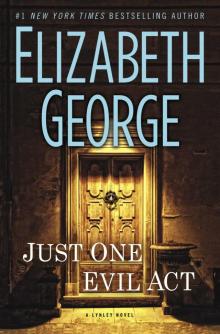 Just One Evil Act
Just One Evil Act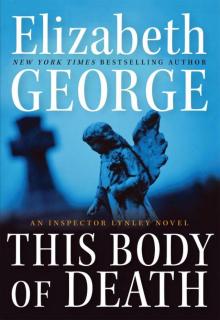 This Body of Death
This Body of Death The Edge of the Water
The Edge of the Water For the Sake of Elena
For the Sake of Elena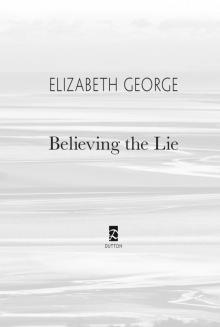 Believing the Lie
Believing the Lie The Edge of the Shadows
The Edge of the Shadows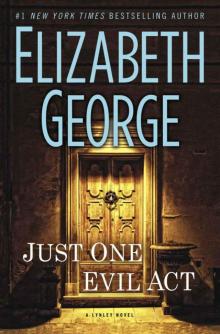 Just One Evil Act: A Lynley Novel
Just One Evil Act: A Lynley Novel In Pursuit of the Proper Sinner
In Pursuit of the Proper Sinner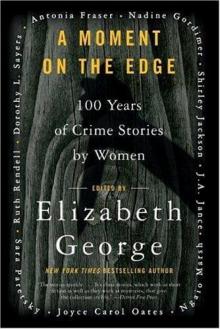 A Moment on the Edge:100 Years of Crime Stories by women
A Moment on the Edge:100 Years of Crime Stories by women Elizabeth I
Elizabeth I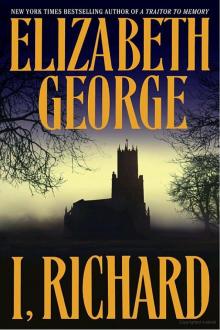 I, Richard
I, Richard A Traitor to Memory
A Traitor to Memory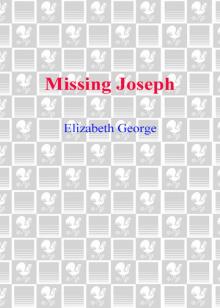 Missing Joseph
Missing Joseph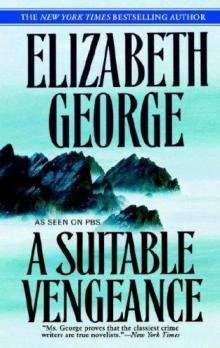 A Suitable Vengeance
A Suitable Vengeance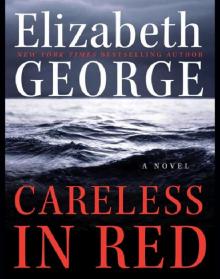 Careless in Red
Careless in Red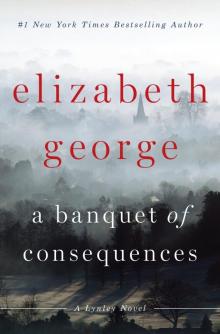 A Banquet of Consequences
A Banquet of Consequences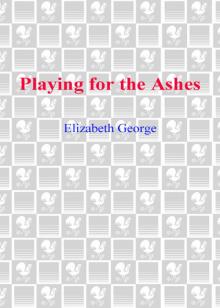 Playing for the Ashes
Playing for the Ashes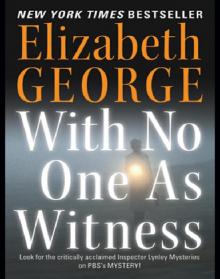 With No One As Witness
With No One As Witness Deception on His Mind
Deception on His Mind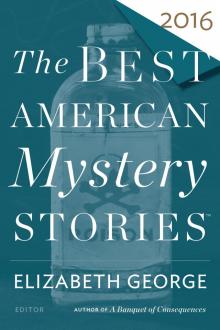 The Best American Mystery Stories 2016
The Best American Mystery Stories 2016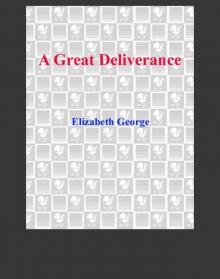 A Great Deliverance
A Great Deliverance In the Presence of the Enemy
In the Presence of the Enemy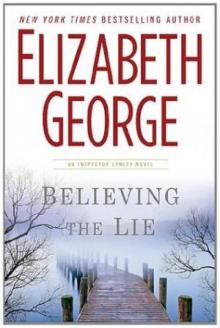 Believing the Lie il-17
Believing the Lie il-17 The Edge of the Light
The Edge of the Light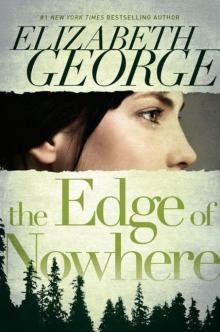 SW01 - The Edge of Nowhere
SW01 - The Edge of Nowhere A Place of Hiding
A Place of Hiding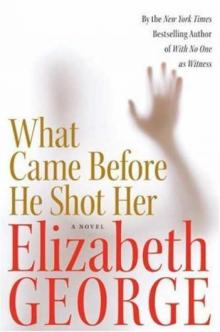 What Came Before He Shot Her il-14
What Came Before He Shot Her il-14 Payment In Blood
Payment In Blood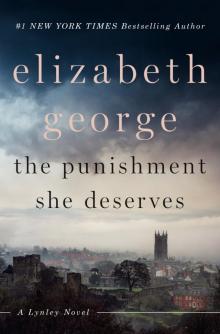 The Punishment She Deserves
The Punishment She Deserves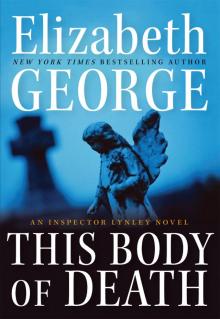 This Body of Death: An Inspector Lynley Novel
This Body of Death: An Inspector Lynley Novel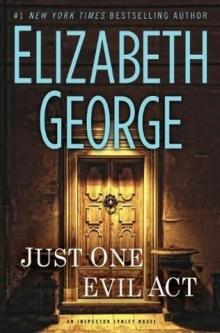 Just One Evil Act il-18
Just One Evil Act il-18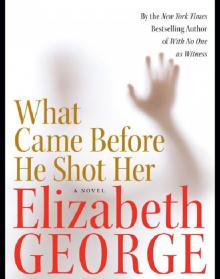 What Came Before He Shot Her
What Came Before He Shot Her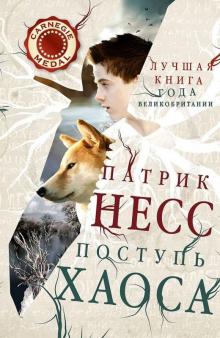 Missing Joseph il-6
Missing Joseph il-6